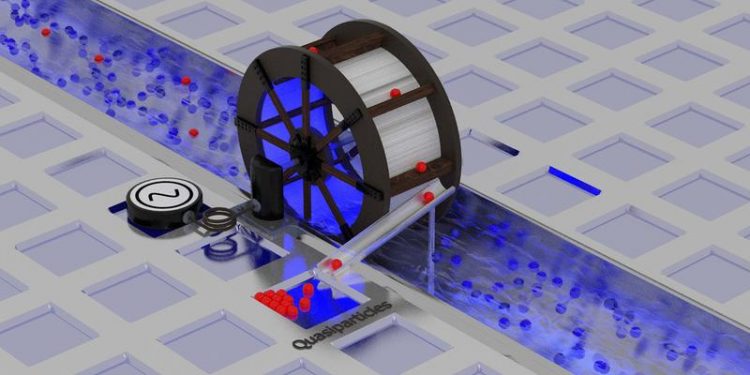Further Improvement of Qubit Lifetime for Quantum Computers

Illustration of the filtering of unwanted quasiparticles (red spheres) from a stream of superconducting electron pairs (blue spheres) using a microwave-driven pump. Copyright: Philip Krantz, Krantz NanoArt
Quantum computers could one day achieve significantly higher computing speeds than conventional digital computers in performing certain types of tasks. Superconducting circuits belong to the most promising candidates for implementing quantum bits, known as qubits, with which quantum computers can store and process information.
The high error rates associated with previously available qubits have up to now limited the size and efficiency of quantum computers. Dr. Gianluigi Catelani of the Peter Grünberg Institute (PGI-2) in Jülich, together with his colleagues has now found a way to prolong the time in which the superconducting circuits are able to store a “0” or a “1” without errors. Beside Catelani, the team comprises researchers working in the USA (Massachusetts Institute of Technology, Lincoln Laboratory, and the University of California, Berkeley), Japan (RIKEN), and Sweden (Chalmers University of Technology).
When superconducting materials are cooled below a material-specific critical temperature, electrons come together to form pairs; then current can flow without resistance. However, so far it has not been possible to build superconducting circuits in which all electrons bundle together. Single electrons remain unpaired and are unable to flow without resistance. Due to these so-called quasiparticles, energy is lost and this limits the length of time that the circuits can store data.
Researchers have now developed and tested a technique that can temporarily remove unpaired electrons away from the circuit; with the help of microwave pulses, they are in effect “pumped out”. This results in a three-fold improvement in the lifespan of the qubits.
“The technique can in principle be put to immediate use for all superconducting qubits”, explained Catelani, who, as a theoretical physicist has contributed to the analysis and interpretation of the experimental data. However, he emphasised that the lifespan of qubits is only one of many hurdles in the development of complex quantum computers. Moreover, the new technique means that the quasiparticles are not permanently removed, but flow back again and again.
The scientists have another solution ready to solve this problem: the pumping technique can be combined with another method that permanently traps the quasiparticles. Catelani, together with his colleagues from Jülich and Yale, has already analysed and tested such a quasiparticle “trap”. Their results were published in September in the journal Physical Review B (DOI: 10.1103/PhysRevB.94.104516).
Original publication:
Suppressing relaxation in superconducting qubits by quasiparticle pumping;
Simon Gustavsson et al.;
Science (to be published online on 8. Dec. 2016), DOI: 10.1126/science.aah5844 (available from 8:00 pm CET).
Special Notes to Reporters: More information, including the Science press package and a copy of the paper, can be found online at http://www.eurekalert.org/jrnls/sci. You will need your user ID and password to access this information.
Contact:
Dr. Gianluigi Catelani,
Peter Grünberg Institute, Theoretical Nanoelectronics (PGI-2),
Forschungszentrum Jülich, Germany
Phone: +49 2461 61-9360
Email: g.catelani@fz-juelich.de
Press contact:
Angela Wenzik, Science Journalist,
Forschungszentrum Jülich, Germany
Phone: +49 2461 61-6048,
Email: a.wenzik@fz-juelich.de
http://www.fz-juelich.de Forschungszentrum Jülich
http://www.fz-juelich.de/pgi/pgi-2/EN/ Research at the Peter Grünberg Institute, Theoretical Nanoelectronics (PGI-2)
http://www.fz-juelich.de/SharedDocs/Pressemitteilungen/UK/EN/2014/14-04-17quantu… Press release from 17.4.2014 „Quantum computing: 50-year-old prediction confirmed“
Media Contact
All latest news from the category: Physics and Astronomy
This area deals with the fundamental laws and building blocks of nature and how they interact, the properties and the behavior of matter, and research into space and time and their structures.
innovations-report provides in-depth reports and articles on subjects such as astrophysics, laser technologies, nuclear, quantum, particle and solid-state physics, nanotechnologies, planetary research and findings (Mars, Venus) and developments related to the Hubble Telescope.
Newest articles

First-of-its-kind study uses remote sensing to monitor plastic debris in rivers and lakes
Remote sensing creates a cost-effective solution to monitoring plastic pollution. A first-of-its-kind study from researchers at the University of Minnesota Twin Cities shows how remote sensing can help monitor and…

Laser-based artificial neuron mimics nerve cell functions at lightning speed
With a processing speed a billion times faster than nature, chip-based laser neuron could help advance AI tasks such as pattern recognition and sequence prediction. Researchers have developed a laser-based…

Optimising the processing of plastic waste
Just one look in the yellow bin reveals a colourful jumble of different types of plastic. However, the purer and more uniform plastic waste is, the easier it is to…


